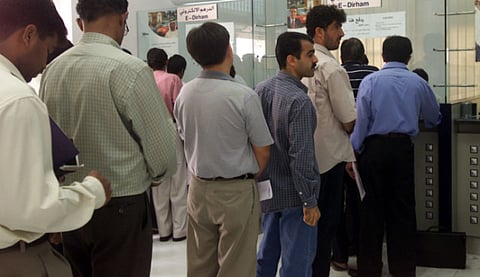'UAE bank customers need more protection'
Laws should provide more protection for bank clients, says FNC report

Abu Dhabi: Members of the Federal National Council (FNC) have demanded banking laws be overhauled to provide more rights and protection for bank customers and entrepreneurs against what they called “high handed tactics”.
A report made by the FNC financial committee suggests laws should be revised and policies be set for protecting bank clients.
Ali Eisa Al Nuaimi, a member from Ajman and rapporteur of the panel, said banking laws should be revised to match the growing number of banks operating in the country, the wide variety of financial transactions and products and changes in the economy in the UAE and abroad.
“Laws should set out improved rights for bank customers, whether individuals, families or small businesses. They should set the standards for fairness, transparency, behaviour and accountability that customers can expect from their banks,” Al Nuaimi said.
Al Nuaimi added contracts signed by bank customers have never been reviewed by the consumer protection society and usually favour banks with clients being in a disadvantaged position in terms of product knowledge and bargaining power.
“Therefore, these clients need to be treated fairly and protected from unscrupulous sales practices or misrepresentations. They should be able to know what they are buying, the costs involved and all other relevant terms and features of the transactions and should not be subject to high-handed sales tactics,” Al Nuaimi said.
He explained customers, who entrust their bank with their hard-earned money or life savings and their loss is likely to be huge, want to be confident that their bank will do the right thing by them, and the laws should provide straightforward ways for clients to complain if they feel their bank has not met its obligations under the law.
The FNC report also demands the deposit insurance system, once in place, be reinstated.
Al Nuaimi said a deposit insurance system was needed to protect bank depositors from losses caused by a bank’s inability to pay its debts when due, stressing that deposit insurance systems are one component of a financial system safety net that promotes financial stability.
The report also called for setting up a department at the UAE Central Bank to constantly study the viability of pegging the dirham to the US dollar.
Al Nuaimi said pegging the dirham to the US dollar caused at times inflation, increased import costs and weaker purchase power for consumers abroad.
The UAE dirham was introduced in 1973, replacing the Qatar and Dubai riyal, which had circulated since 1966 in all of the emirates except Abu Dhabi, where the dirham replaced the Bahraini.
In 1978, the dirham was officially pegged to the International Monetary Fund’s (IMF) special drawing rights (SDRs). In practice, it is pegged to the US dollar for most of the time. Since November 1997, the dirham has been pegged to the US dollar.
Al Nuaimi said the FNC financial panel also found that small and medium enterprises SMEs and entrepreneurs are not treated fairly by banks, which demand many guarantees and impose high fees and interest rates on these SMEs. The FNC report also highlight shortfalls in emiratisation of HR managers in banks.

![Interior Ministry urged public not to share personal data after reports of impersonation scams. [Illustrative image]](http://media.assettype.com/gulfnews%2Fimport%2F2018%2F11%2F18%2Fphone_scam_resources1_16a0851f059_large.jpg?w=320&auto=format%2Ccompress&fit=max)

